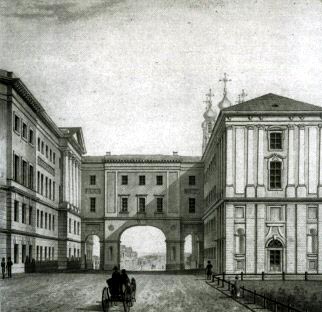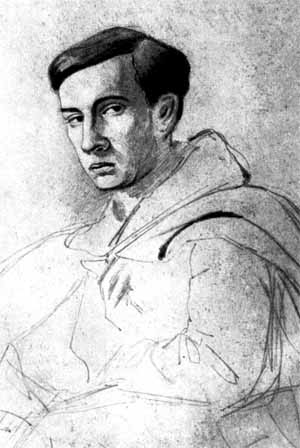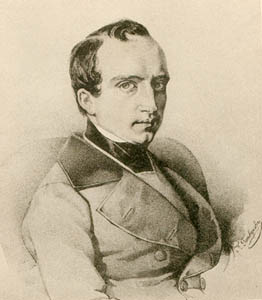|
Sovremennik
''Sovremennik'' ( rus, «Современник», p=səvrʲɪˈmʲenʲːɪk, a=Ru-современник.ogg, "The Contemporary") was a Russian literary, social and political magazine, published in Saint Petersburg in 1836–1866. It came out four times a year in 1836–1843 and once a month after that. The magazine published poetry, prose, critical, historical, ethnographic and other material. ''Sovremennik'' originated as a private enterprise of Alexander Pushkin who was running out of money to support his growing family. To assist him with the magazine, the poet asked Nikolai Gogol, Pyotr Vyazemsky and Vladimir Odoyevsky to contribute their works to the journal. It was there that the first substantial assortment of Fyodor Tyutchev's poems was published. Soon it became clear that Pushkin's establishment could not compete with Faddey Bulgarin's journal, which published more popular and less demanding literature. ''Sovremennik'' was out of date and could not command a paying a ... [...More Info...] [...Related Items...] OR: [Wikipedia] [Google] [Baidu] |
Nikolay Nekrasov
Nikolay Alexeyevich Nekrasov ( rus, Никола́й Алексе́евич Некра́сов, p=nʲɪkɐˈlaj ɐlʲɪkˈsʲejɪvʲɪtɕ nʲɪˈkrasəf, a=Ru-Nikolay_Alexeyevich_Nekrasov.ogg, – ) was a Russian poet, writer, critic and publisher, whose deeply compassionate poems about the Russian peasantry made him a hero of liberal and radical circles in the Russian intelligentsia of the mid-nineteenth century, particularly as represented by Vissarion Belinsky and Nikolay Chernyshevsky. He is credited with introducing into Russian poetry ternary meters and the technique of dramatic monologue (''On the Road'', 1845). As the editor of several literary journals, notably ''Sovremennik'', Nekrasov was also singularly successful and influential. Biography Early years Nikolay Alexeyevich Nekrasov was born in Nemyriv (now in Vinnytsia Oblast, Ukraine), in the Bratslavsky Uyezd of Podolia Governorate. His father Alexey Sergeyevich Nekrasov (1788-1862) was a descendant from Russian l ... [...More Info...] [...Related Items...] OR: [Wikipedia] [Google] [Baidu] |
Mikhail Saltykov-Shchedrin
Mikhail Yevgrafovich Saltykov-Shchedrin ( rus, Михаи́л Евгра́фович Салтыко́в-Щедри́н, p=mʲɪxɐˈil jɪvˈɡrafəvʲɪtɕ səltɨˈkof ɕːɪˈdrʲin; – ), born Mikhail Yevgrafovich Saltykov and known during his lifetime by the pen name Nikolai Shchedrin ( rus, Николай Щедрин), was a major Russian writer and satirist of the 19th century. He spent most of his life working as a civil servant in various capacities. After the death of poet Nikolay Nekrasov, he acted as editor of a Russian literary magazine ''Otechestvenniye Zapiski'' until the Tsarist government banned it in 1884. In his works Saltykov mastered both stark realism and satirical grotesque merged with fantasy. His most famous works, the family chronicle novel ''The Golovlyov Family'' (1880) and the political novel ''The History of a Town'' (1870) became important works of 19th-century fiction, and Saltykov is regarded as a major figure of Russian literary Realism. B ... [...More Info...] [...Related Items...] OR: [Wikipedia] [Google] [Baidu] |
Dmitry Grigorovich
Dmitry Vasilyevich Grigorovich (russian: Дми́трий Васи́льевич Григоро́вич) ( – ) was a Russian writer, best known for his first two novels, '' The Village'' and '' Anton Goremyka'', and lauded as the first author to have realistically portrayed the life of the Russian rural community and openly condemn the system of serfdom. Biography Dmitry Grigorovich was born in Simbirsk to a family of the landed gentry. His Russian father was a retired hussar officer, his French mother, Cydonia de Varmont, was a daughter of a royalist who perished on guillotine in the times of the Reign of Terror. Having lost his father early in his life, Dmitry was brought up by his mother and grandmother, the two women who hardly spoke anything but French. Up until the age of eight the boy had serious difficulties with his Russian.Meshcheryakov, V. The Introduction to the Selected Works by D.V.Grigorovich. Moscow. Khudozhestvennaya Literatura Publishers, 1976. Pp. 527-53 ... [...More Info...] [...Related Items...] OR: [Wikipedia] [Google] [Baidu] |
Ivan Goncharov
Ivan Alexandrovich Goncharov (, also ; rus, Ива́н Алекса́ндрович Гончаро́в, r=Iván Aleksándrovich Goncharóv, p=ɪˈvan ɐlʲɪkˈsandrəvʲɪdʑ ɡənʲtɕɪˈrof; – ) was a Russian novelist best known for his novels ''The Same Old Story'' (1847), ''Oblomov'' (1859), and '' The Precipice'' (1869, also translated as ''Malinovka Heights''). He also served in many official capacities, including the position of censor. Goncharov was born in Simbirsk into the family of a wealthy merchant; as a reward for his grandfather's military service, they were elevated to gentry status. He was educated at a boarding school, then the Moscow College of Commerce, and finally at Moscow State University. After graduating, he served for a short time in the office of the Governor of Simbirsk, before moving to Saint Petersburg where he worked as government translator and private tutor, while publishing poetry and fiction in private almanacs. Goncharov's first novel, ' ... [...More Info...] [...Related Items...] OR: [Wikipedia] [Google] [Baidu] |
Vissarion Belinsky
Vissarion Grigoryevich Belinsky ( rus, Виссарион Григорьевич БелинскийIn Belinsky's day, his name was written ., Vissarión Grigórʹjevič Belínskij, vʲɪsərʲɪˈon ɡrʲɪˈɡorʲjɪvʲɪdʑ bʲɪˈlʲinskʲɪj; – ) was a Russian literary critic of Westernizer, Westernizing tendency. Belinsky played one of the key roles in the career of poet and publisher Nikolay Nekrasov and his popular magazine ''Sovremennik''. He was the most influential of the Westernizers, especially among the younger generation. He worked primarily as a literary critic, because that area was less heavily censored than political pamphlets. He agreed with Slavophiles that society had precedence over individualism, but he insisted the society had to allow the expression of individual ideas and individual rights, rights. He strongly opposed Slavophiles on the role of Orthodoxy, which he considered a retrograde force. He emphasized reason and knowledge, and attacked autoc ... [...More Info...] [...Related Items...] OR: [Wikipedia] [Google] [Baidu] |
Alexander Pushkin
Alexander Sergeyevich Pushkin (; rus, links=no, Александр Сергеевич ПушкинIn pre-Revolutionary script, his name was written ., r=Aleksandr Sergeyevich Pushkin, p=ɐlʲɪkˈsandr sʲɪrˈɡʲe(j)ɪvʲɪtɕ ˈpuʂkʲɪn, a=ru-Pushkin.ogg; ) was a Russian poet, playwright, and novelist of the Romantic era.Basker, Michael. Pushkin and Romanticism. In Ferber, Michael, ed., ''A Companion to European Romanticism''. Oxford: Blackwell, 2005. He is considered by many to be the greatest Russian poetShort biography from University of Virginia . Retrieved 24 November 2006.Allan Rei ... [...More Info...] [...Related Items...] OR: [Wikipedia] [Google] [Baidu] |
Nikolai Dobrolyubov
Nikolay Alexandrovich Dobrolyubov ( rus, Никола́й Алекса́ндрович Добролю́бов, p=nʲɪkɐˈlaj ɐlʲɪˈksandrəvʲɪtɕ dəbrɐˈlʲubəf, a=Nikolay Alyeksandrovich Dobrolyubov.ru.vorb.oga; 5 February Old_Style_and_New_Style_dates">O._S._24_January.html" ;"title="Old_Style_and_New_Style_dates.html" ;"title="nowiki/>Old Style and New Style dates">O. S. 24 January">Old_Style_and_New_Style_dates.html" ;"title="nowiki/>Old Style and New Style dates">O. S. 24 January1836 – 29 November [O. S. 17 November] 1861) was a Russian poet, literary critic, journalist, and prominent figure of the Russian revolutionary movement. He was a literary hero to both Karl Marx and Lenin. Life Dobrolyubov was born in Nizhny Novgorod where his father was a poor priest. He was educated at a clerical primary school, then at a seminary from 1848 to 1853. He was considered a prodigy by his teachers in the seminary, and at home he spent most of his time in his father's libra ... [...More Info...] [...Related Items...] OR: [Wikipedia] [Google] [Baidu] |
Alexander Nikitenko
Alexander Vasilievich Nikitenko (Алекса́ндр Васи́льевич Никите́нко; 12 March 1804 – 21 July 1877) was a prominent literary historian. A well-educated Ukrainian serf of Count Sheremetev who was granted freedom under pressure from Kondraty Ryleyev and other men of letters. He narrowly escaped persecution in the wake of the Decembrist Uprising and served as censor through much of Nicholas I's reign. He was also a literary historian, censor, Professor of Saint Petersburg University, and ordinary member of St. Petersburg Academy of Sciences. Nikitenko is notable for a very detailed diary that he kept from an early age. It appeared in print in 1888-92; an abridged English translation was published in 1975. Biography Alexander Nikitenko was born a Little-Russian serf, property of Count Nikolai Sheremetev, stationed in Alekseevka Sloboda of the Biruchenskii uezd. Nikitenko was born in 1804 or 1805; his father, who served as senior clerk in ... [...More Info...] [...Related Items...] OR: [Wikipedia] [Google] [Baidu] |
Ivan Panaev
Ivan Ivanovich Panaev (russian: link=no, Ива́н Ива́нович Пана́ев; March 27, 1812 – March 2, 1862) was a Russian writer, literary critic, journalist and magazine publisher. Early life Panaev was born into a gentry family in St Petersburg.Handbook of Russian Literature, Victor Terras, Yale University Press 1990. He graduated from the Boarding School for the Nobility at Saint Petersburg State University in 1830. He began publishing his works in 1834. His first romantic novellas included ''The Bedroom of a Society Woman'' (1834, published 1835) and ''She Will Be Happy'' (1836).The Great Soviet Encyclopedia, 3rd Edition (1970–1979). He married Avdotya Bryanskaya in 1837. Avdotya became a well-known writer and memoirist. Career Panaev became acquainted with Vissarion Belinsky in 1839; their friendship significantly influenced Panaev's literary career. Between 1839 and 1846 his works were published in ''Otechestvennye Zapiski''. They included the novellas ''Th ... [...More Info...] [...Related Items...] OR: [Wikipedia] [Google] [Baidu] |
Nikolai Chernyshevsky
Nikolay Gavrilovich Chernyshevsky ( – ) was a Russian literary and social critic, journalist, novelist, democrat, and socialist philosopher, often identified as a utopian socialist and leading theoretician of Russian nihilism. He was the dominant intellectual figure of the 1860s revolutionary democratic movement in Russia, despite spending much of his later life in exile to Siberia, and was later highly praised by Karl Marx, Georgi Plekhanov, and Vladimir Lenin. Biography The son of a priest, Chernyshevsky was born in Saratov in 1828, and stayed there until 1846. He graduated at the local seminary where he learned English, French, German, Italian, Latin, Greek and Old Slavonic. It was there he gained a love of literature. At St Petersburg University he often struggled to warm his room. He kept a diary of trivia like the number of tears he shed over a dead friend. It was here that he became an atheist. He was inspired by the works of Hegel, Ludwig Feuerbach and Charles ... [...More Info...] [...Related Items...] OR: [Wikipedia] [Google] [Baidu] |
Maxim Antonovich
Maxim Alexeyevich Antonovich (russian: Макси́м Алексе́евич Антоно́вич; 9 May 1835, – 14 November 1918) was a Russian literary critic, essayist, memoirist, translator and philosopher. Biography Maxim Antonovich was born in Belopolye, Sumskoy Uyezd, Kharkov Governorate, to the family of a clergyman. After studying at the Kharkiv seminary he enrolled in the Saint Petersburg Theological Academy which he graduated in 1859. Antonovich's literary career started in ''Sovremennik'' where several articles promoting the philosophy of materialism brought him the reputation of an "ideological heir to Chernyshevsky." As a head of the magazine's literary criticism department (a position he took after Nikolai Dobrolyubov's death) Antonovich waged bitter feuds against ''Vremya'', '' Epokha'', and later '' Russkoye Slovo'', after his slagging of Ivan Turgenev's '' Fathers and Sons'' in 1862 outraged Dmitry Pisarev and a violent confrontation ensued which Fyodor Dosto ... [...More Info...] [...Related Items...] OR: [Wikipedia] [Google] [Baidu] |
Vladimir Odoyevsky
Prince Vladimir Fyodorovich Odoyevsky (russian: Влади́мир Фёдорович Одо́евский, p=ɐˈdojɪfskʲɪj; Владимир Федорович Одоевский. Библиографический указатель. Энциклопедия Хоронос//http://hrono.ru/biograf/bio_o/odoevski_vf.php – ) was a prominent Russian Empire, Russian Imperial philosopher, writer, music critic, philanthropist and pedagogy, pedagogue. He became known as the "Russian E.T.A. Hoffmann, Hoffmann" and even the "Russian Johann Faust, Faust" on account of his keen interest in phantasmagoria, phantasmagoric tales and musical criticism. Biography The last member of the princely House of Odoyev, he was genealogically the most senior member of the House of Rurik. He was born to Prince Fyodor Sergeevich Odoyevsky (1771–1808), a state councillor (''statsky sovietnik''). His father started out as an adjutant of Prince Grigory Potemkin, Grigory Potyomkin, then, in 1798 he en ... [...More Info...] [...Related Items...] OR: [Wikipedia] [Google] [Baidu] |










